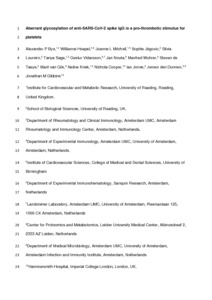Bye, AP;
Hoepel, W;
Mitchell, JL;
Jegouic, S;
Loureiro, S;
Sage, T;
Vidarsson, G;
Nouta, J;
Wuhrer, M;
de Taeye, S;
et al.
Bye, AP; Hoepel, W; Mitchell, JL; Jegouic, S; Loureiro, S; Sage, T; Vidarsson, G; Nouta, J; Wuhrer, M; de Taeye, S; van Gils, M; Kriek, N; Cooper, N; Jones, I; den Dunnen, J; Gibbins, JM
(2021)
Aberrant glycosylation of anti-SARS-CoV-2 spike IgG is a prothrombotic stimulus for platelets.
Blood, 138 (16).
pp. 1481-1489.
ISSN 1528-0020
https://doi.org/10.1182/blood.2021011871
SGUL Authors: Bye, Alexander Paul
![[img]](https://openaccess.sgul.ac.uk/114085/1.hassmallThumbnailVersion/Manuscript.pdf)  Preview |
|
PDF
Accepted Version
Available under License ["licenses_description_publisher" not defined].
Download (967kB)
| Preview
|
Abstract
A subset of patients with coronavirus disease 2019 (COVID-19) become critically ill, suffering from severe respiratory problems and also increased rates of thrombosis. The causes of thrombosis in severely ill patients with COVID-19 are still emerging, but the coincidence of critical illness with the timing of the onset of adaptive immunity could implicate an excessive immune response. We hypothesized that platelets might be susceptible to activation by anti-severe acute respiratory syndrome coronavirus 2 (anti-SARS-CoV-2) antibodies and might contribute to thrombosis. We found that immune complexes containing recombinant SARS-CoV-2 spike protein and anti-spike immunoglobulin G enhanced platelet-mediated thrombosis on von Willebrand factor in vitro, but only when the glycosylation state of the Fc domain was modified to correspond with the aberrant glycosylation previously identified in patients with severe COVID-19. Furthermore, we found that activation was dependent on FcgammaRIIA, and we provide in vitro evidence that this pathogenic platelet activation can be counteracted by the therapeutic small molecules R406 (fostamatinib) and ibrutinib, which inhibit tyrosine kinases Syk and Btk, respectively, or by the P2Y12 antagonist cangrelor.
| Item Type: |
Article
|
| Additional Information: |
This research was originally published in Blood. Bye, AP; Hoepel, W; Mitchell, JL; Jegouic, S; Loureiro, S; Sage, T; Vidarsson, G; Nouta, J; Wuhrer, M; de Taeye, S; et al. Aberrant glycosylation of anti-SARS-CoV-2 spike IgG is a prothrombotic stimulus for platelets. Blood. 2021;138:1481-1489. © the American Society of Hematology. |
| Keywords: |
Antibodies, Viral/blood/immunology Antigen-Antibody Complex/immunology Blood Platelets/immunology/metabolism/*pathology COVID-19/*complications/immunology/virology Glycosylation Humans Immunoglobulin G/*immunology Platelet Activation/immunology SARS-CoV-2, Immunology, 1102 Cardiorespiratory Medicine and Haematology, 1103 Clinical Sciences, 1114 Paediatrics and Reproductive Medicine |
| SGUL Research Institute / Research Centre: |
Academic Structure > Molecular and Clinical Sciences Research Institute (MCS) |
| Journal or Publication Title: |
Blood |
| ISSN: |
1528-0020 |
| Publisher License: |
Publisher's own licence |
| Projects: |
|
| URI: |
https://openaccess.sgul.ac.uk/id/eprint/114085 |
| Publisher's version: |
https://doi.org/10.1182/blood.2021011871 |
Statistics
Item downloaded times since 04 Feb 2022.
Actions (login required)
 |
Edit Item |


